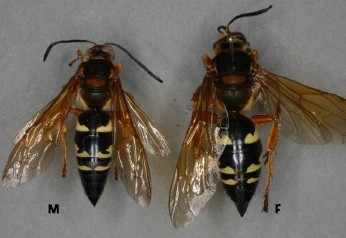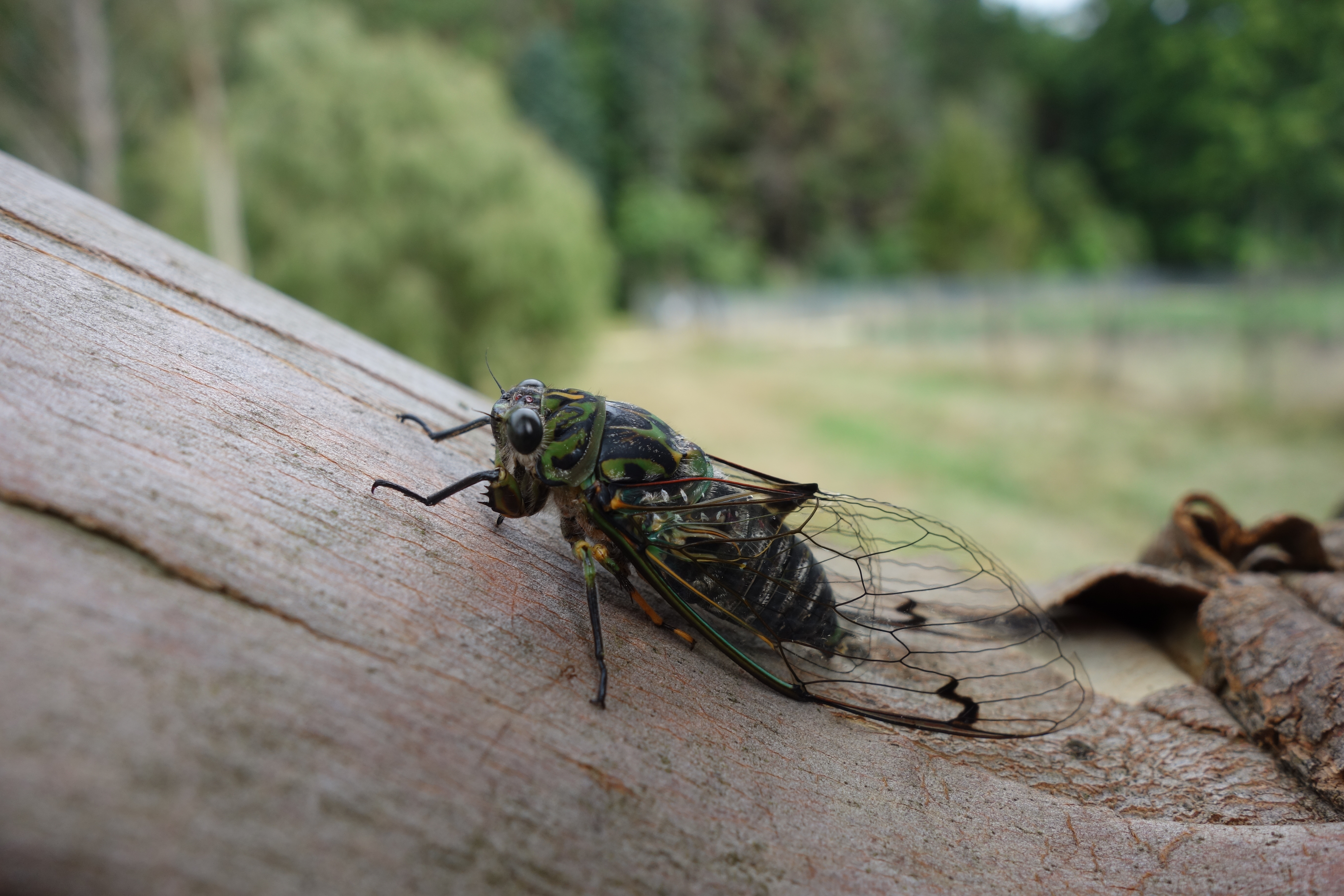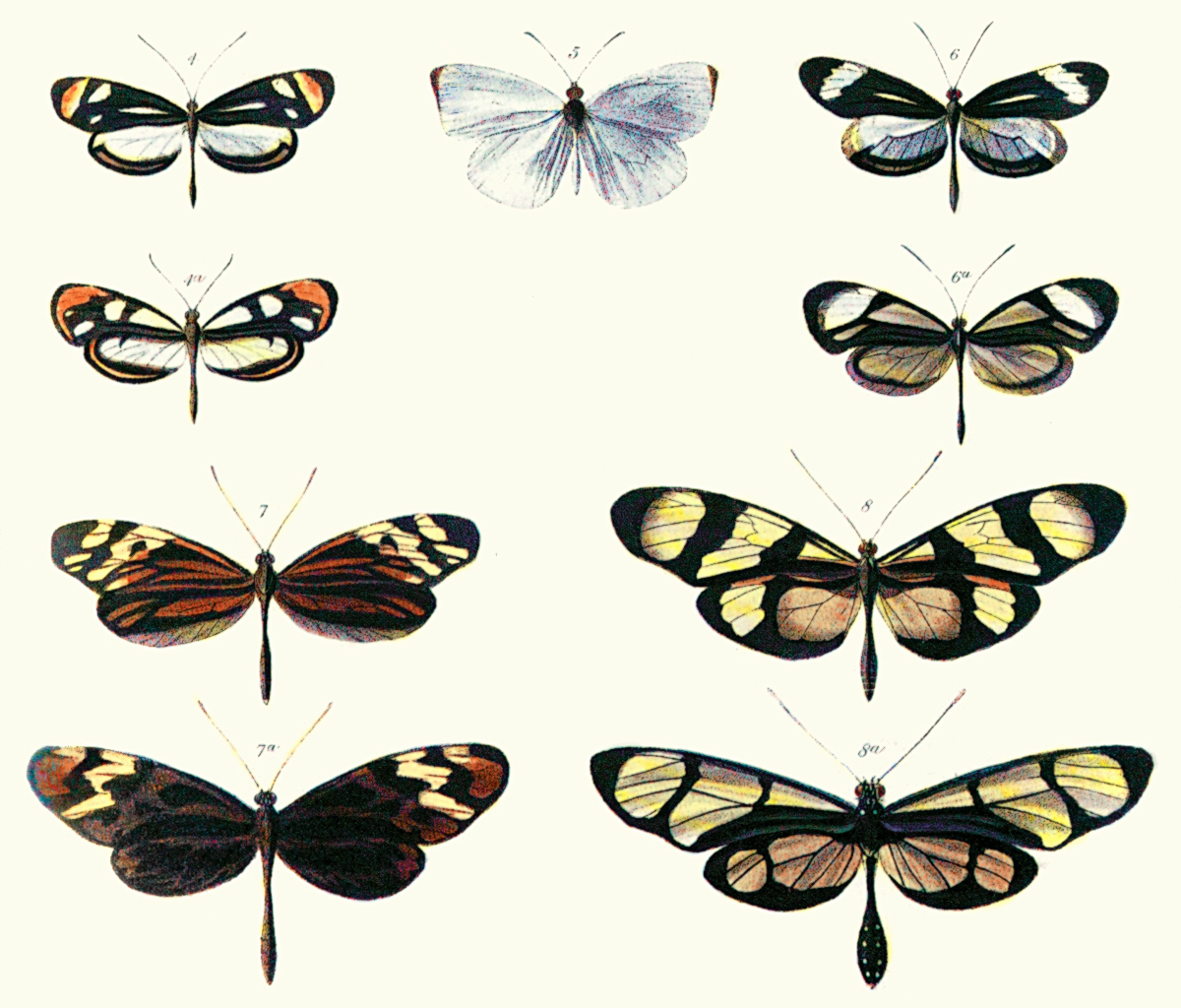|
Sphecius
Cicada killer wasps ( genus ''Sphecius'') are large, solitary, ground-dwelling, predatory wasps. They are so named because they hunt cicadas and provision their nests with them, after stinging and paralyzing them. Twenty-one species worldwide are recognized. The highest diversity occurs in the region between North Africa and Central Asia. In North America, the term "cicada killer wasp" usually refers to the most well-known species, the eastern cicada killer (''S. speciosus''). A few other related genera also are sometimes referred to as "cicada killers", e.g. ''Liogorytes'' in South America and '' Exeirus'' in Australia. The use of cicadas as prey is in keeping with the typical behavior of the tribe Gorytini, which tend to specialize on various members of the Cicadomorpha as prey items. Species This list of species is probably complete as of March 31, 2009. It has been adapted from thCatalog of ''Sphecius'' species(California Academy of Sciences). Notable subspecies are ... [...More Info...] [...Related Items...] OR: [Wikipedia] [Google] [Baidu] |
Sphecius Grandis
''Sphecius grandis'', also called the western cicada killer, is a species of cicada killer wasp (''Sphecius''). The western species shares the same nesting biology as its fellow species, the eastern cicada killer ('' S. speciosus''). ''S. grandis'', like all other species of the genus ''Sphecius'', mainly provides cicadas for its offspring. It forms nest aggregations and mates and broods once in a year, in July and early August. The wasp is on average to in length and is amber-yellow with yellow rings on its abdomen. Wasps in the genus ''Sphecius'' are not habitually aggressive and use their venom mainly to paralyse cicadas which they take back to their nests to feed their young. The females catch around four or more cicadas for provisioning, place them in brood cells and lay eggs in the cells. ''S. grandis'' is endemic to Central America, Mexico and the Western United States, and is found at a higher mean altitude than other species of ''Sphecius''. The western ci ... [...More Info...] [...Related Items...] OR: [Wikipedia] [Google] [Baidu] |
Cicada
The cicadas () are a superfamily, the Cicadoidea, of insects in the order Hemiptera (true bugs). They are in the suborder Auchenorrhyncha, along with smaller jumping bugs such as leafhoppers and froghoppers. The superfamily is divided into two families, the Tettigarctidae, with two species in Australia, and the Cicadidae, with more than 3,000 species Taxonomy (biology)#Taxonomic descriptions, described from around the world; many species remain undescribed. Cicadas have prominent eyes set wide apart, short antennae, and membranous front wings. They have an exceptionally loud song, produced in most species by the rapid buckling and unbuckling of drumlike tymbals. The earliest known fossil Cicadomorpha appeared in the Upper Permian period; extant species occur all around the world in temperate to tropical climates. They typically live in trees, feeding on watery sap from xylem tissue, and laying their eggs in a slit in the bark. Most cicadas are crypsis, cryptic. The vast majorit ... [...More Info...] [...Related Items...] OR: [Wikipedia] [Google] [Baidu] |
Western Cicada Killer
''Sphecius grandis'', also called the western cicada killer, is a species of cicada killer wasp (''Sphecius''). The western species shares the same nesting biology as its fellow species, the eastern cicada killer ('' S. speciosus''). ''S. grandis'', like all other species of the genus ''Sphecius'', mainly provides cicadas for its offspring. It forms nest aggregations and mates and broods once in a year, in July and early August. The wasp is on average to in length and is amber-yellow with yellow rings on its abdomen. Wasps in the genus ''Sphecius'' are not habitually aggressive and use their venom mainly to paralyse cicadas which they take back to their nests to feed their young. The females catch around four or more cicadas for provisioning, place them in brood cells and lay eggs in the cells. ''S. grandis'' is endemic to Central America, Mexico and the Western United States, and is found at a higher mean altitude than other species of ''Sphecius''. The western ci ... [...More Info...] [...Related Items...] OR: [Wikipedia] [Google] [Baidu] |
Cicada Wasp (4)
The cicadas () are a superfamily, the Cicadoidea, of insects in the order Hemiptera (true bugs). They are in the suborder Auchenorrhyncha, along with smaller jumping bugs such as leafhoppers and froghoppers. The superfamily is divided into two families, the Tettigarctidae, with two species in Australia, and the Cicadidae, with more than 3,000 species described from around the world; many species remain undescribed. Cicadas have prominent eyes set wide apart, short antennae, and membranous front wings. They have an exceptionally loud song, produced in most species by the rapid buckling and unbuckling of drumlike tymbals. The earliest known fossil Cicadomorpha appeared in the Upper Permian period; extant species occur all around the world in temperate to tropical climates. They typically live in trees, feeding on watery sap from xylem tissue, and laying their eggs in a slit in the bark. Most cicadas are cryptic. The vast majority of species are active during the day as adults, ... [...More Info...] [...Related Items...] OR: [Wikipedia] [Google] [Baidu] |
Species
In biology, a species is the basic unit of Taxonomy (biology), classification and a taxonomic rank of an organism, as well as a unit of biodiversity. A species is often defined as the largest group of organisms in which any two individuals of the appropriate sexes or mating types can reproduction, produce Fertility, fertile offspring, typically by sexual reproduction. Other ways of defining species include their karyotype, DNA sequence, morphology (biology), morphology, behaviour or ecological niche. In addition, paleontologists use the concept of the chronospecies since fossil reproduction cannot be examined. The most recent rigorous estimate for the total number of species of eukaryotes is between 8 and 8.7 million. However, only about 14% of these had been described by 2011. All species (except viruses) are given a binomial nomenclature, two-part name, a "binomial". The first part of a binomial is the genus to which the species belongs. The second part is called the specifi ... [...More Info...] [...Related Items...] OR: [Wikipedia] [Google] [Baidu] |
Mimicry
In evolutionary biology, mimicry is an evolved resemblance between an organism and another object, often an organism of another species. Mimicry may evolve between different species, or between individuals of the same species. Often, mimicry functions to protect a species from predators, making it an anti-predator adaptation. Mimicry evolves if a receiver (such as a predator) perceives the similarity between a mimic (the organism that has a resemblance) and a model (the organism it resembles) and as a result changes its behaviour in a way that provides a selective advantage to the mimic. The resemblances that evolve in mimicry can be visual, acoustic, chemical, tactile, or electric, or combinations of these sensory modalities. Mimicry may be to the advantage of both organisms that share a resemblance, in which case it is a form of mutualism; or mimicry can be to the detriment of one, making it parasitic or competitive. The evolutionary convergence between groups is driven b ... [...More Info...] [...Related Items...] OR: [Wikipedia] [Google] [Baidu] |
Sphecius Hemixanthopterus
Cicada killer wasps (genus ''Sphecius'') are large, solitary, ground-dwelling, predatory wasps. They are so named because they hunt cicadas and provision their nests with them, after stinging and paralyzing them. Twenty-one species worldwide are recognized. The highest diversity occurs in the region between North Africa and Central Asia. In North America, the term "cicada killer wasp" usually refers to the most well-known species, the eastern cicada killer (''S. speciosus''). A few other related genera also are sometimes referred to as "cicada killers", e.g. '' Liogorytes'' in South America and '' Exeirus'' in Australia. The use of cicadas as prey is in keeping with the typical behavior of the tribe Gorytini, which tend to specialize on various members of the Cicadomorpha as prey items. Species This list of species is probably complete as of March 31, 2009. It has been adapted from thCatalog of ''Sphecius'' species(California Academy of Sciences). Notable subspecies are also ... [...More Info...] [...Related Items...] OR: [Wikipedia] [Google] [Baidu] |
Sphecius Grandidieri
Cicada killer wasps (genus ''Sphecius'') are large, solitary, ground-dwelling, predatory wasps. They are so named because they hunt cicadas and provision their nests with them, after stinging and paralyzing them. Twenty-one species worldwide are recognized. The highest diversity occurs in the region between North Africa and Central Asia. In North America, the term "cicada killer wasp" usually refers to the most well-known species, the eastern cicada killer (''S. speciosus''). A few other related genera also are sometimes referred to as "cicada killers", e.g. '' Liogorytes'' in South America and '' Exeirus'' in Australia. The use of cicadas as prey is in keeping with the typical behavior of the tribe Gorytini, which tend to specialize on various members of the Cicadomorpha as prey items. Species This list of species is probably complete as of March 31, 2009. It has been adapted from thCatalog of ''Sphecius'' species(California Academy of Sciences). Notable subspecies are also ... [...More Info...] [...Related Items...] OR: [Wikipedia] [Google] [Baidu] |
Sphecius Conicus
Cicada killer wasps (genus ''Sphecius'') are large, solitary, ground-dwelling, predatory wasps. They are so named because they hunt cicadas and provision their nests with them, after stinging and paralyzing them. Twenty-one species worldwide are recognized. The highest diversity occurs in the region between North Africa and Central Asia. In North America, the term "cicada killer wasp" usually refers to the most well-known species, the eastern cicada killer (''S. speciosus''). A few other related genera also are sometimes referred to as "cicada killers", e.g. '' Liogorytes'' in South America and '' Exeirus'' in Australia. The use of cicadas as prey is in keeping with the typical behavior of the tribe Gorytini, which tend to specialize on various members of the Cicadomorpha as prey items. Species This list of species is probably complete as of March 31, 2009. It has been adapted from thCatalog of ''Sphecius'' species(California Academy of Sciences). Notable subspecies are also ... [...More Info...] [...Related Items...] OR: [Wikipedia] [Google] [Baidu] |
Sphecius Claripennis
Cicada killer wasps (genus ''Sphecius'') are large, solitary, ground-dwelling, predatory wasps. They are so named because they hunt cicadas and provision their nests with them, after stinging and paralyzing them. Twenty-one species worldwide are recognized. The highest diversity occurs in the region between North Africa and Central Asia. In North America, the term "cicada killer wasp" usually refers to the most well-known species, the eastern cicada killer (''S. speciosus''). A few other related genera also are sometimes referred to as "cicada killers", e.g. '' Liogorytes'' in South America and '' Exeirus'' in Australia. The use of cicadas as prey is in keeping with the typical behavior of the tribe Gorytini, which tend to specialize on various members of the Cicadomorpha as prey items. Species This list of species is probably complete as of March 31, 2009. It has been adapted from thCatalog of ''Sphecius'' species(California Academy of Sciences). Notable subspecies are also ... [...More Info...] [...Related Items...] OR: [Wikipedia] [Google] [Baidu] |
Sphecius Citrinus
Cicada killer wasps (genus ''Sphecius'') are large, solitary, ground-dwelling, predatory wasps. They are so named because they hunt cicadas and provision their nests with them, after stinging and paralyzing them. Twenty-one species worldwide are recognized. The highest diversity occurs in the region between North Africa and Central Asia. In North America, the term "cicada killer wasp" usually refers to the most well-known species, the eastern cicada killer (''S. speciosus''). A few other related genera also are sometimes referred to as "cicada killers", e.g. '' Liogorytes'' in South America and '' Exeirus'' in Australia. The use of cicadas as prey is in keeping with the typical behavior of the tribe Gorytini, which tend to specialize on various members of the Cicadomorpha as prey items. Species This list of species is probably complete as of March 31, 2009. It has been adapted from thCatalog of ''Sphecius'' species(California Academy of Sciences). Notable subspecies are also ... [...More Info...] [...Related Items...] OR: [Wikipedia] [Google] [Baidu] |
Sphecius Antennatus
Cicada killer wasps (genus ''Sphecius'') are large, solitary, ground-dwelling, predatory wasps. They are so named because they hunt cicadas and provision their nests with them, after stinging and paralyzing them. Twenty-one species worldwide are recognized. The highest diversity occurs in the region between North Africa and Central Asia. In North America, the term "cicada killer wasp" usually refers to the most well-known species, the eastern cicada killer (''S. speciosus''). A few other related genera also are sometimes referred to as "cicada killers", e.g. '' Liogorytes'' in South America and '' Exeirus'' in Australia. The use of cicadas as prey is in keeping with the typical behavior of the tribe Gorytini, which tend to specialize on various members of the Cicadomorpha as prey items. Species This list of species is probably complete as of March 31, 2009. It has been adapted from thCatalog of ''Sphecius'' species(California Academy of Sciences). Notable subspecies are also ... [...More Info...] [...Related Items...] OR: [Wikipedia] [Google] [Baidu] |
.jpg)




